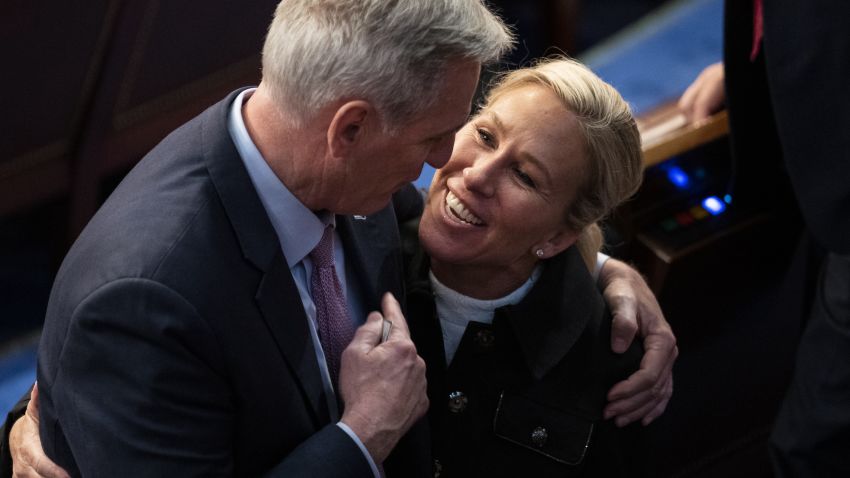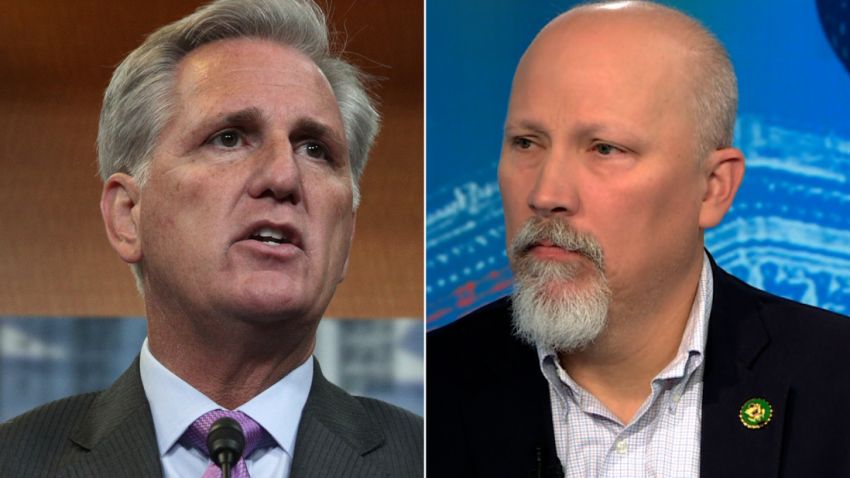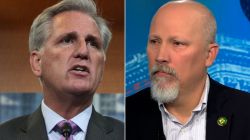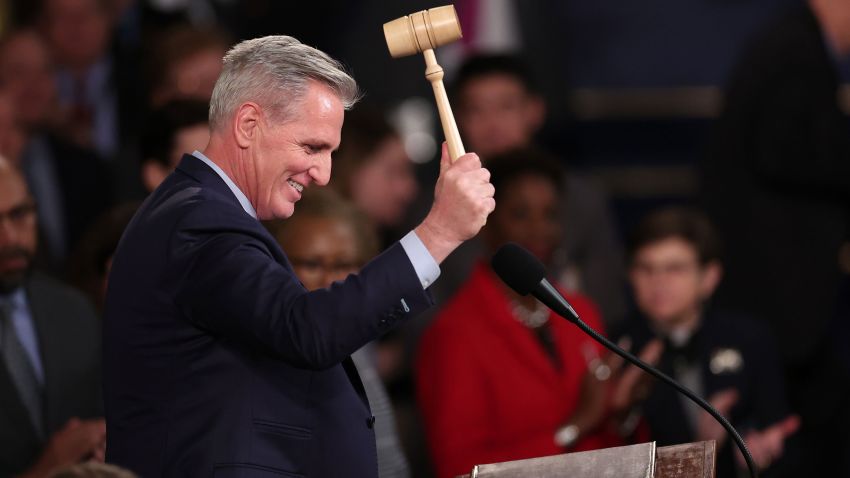Kevin McCarthy faces the first test of his capacity to cling onto power on Monday after he effectively gutted the House speakership of much of its authority so he could secure his dream job.
McCarthy finally won the gavel on the 15th ballot early Saturday morning amid chaotic scenes after pleading with holdouts to relent and caving to the ultra-conservative House Freedom Caucus with repeated concessions.
Now, the new speaker must manage his conference in his first order of business: Attempting to pass a package of House rules that is effectively a ransom on power required by his party’s most extreme elements.
The risk for McCarthy is not just that he undermined his own tenure by agreeing to one particular rule change that means a single member can call for a vote to topple him at any time. It is that he has empowered extremists who could alienate mainstream America and in 2024 endanger the tiny new GOP majority that was built on flipping formerly Democratic seats in states like New York and California.
The ideological extremism of the new House was encapsulated by the fact that on the second anniversary of the Capitol insurrection, McCarthy needed the help of former President Donald Trump, who incited the worst attack on democracy in modern times, to get over the line in the cliffhanger final ballot. In a chilling reminder of that day of infamy, Brazil suffered its own version of January 6 on Sunday as a mob loyal to defeated former President Jair Bolsonaro stormed government buildings. Like Trump, Bolsonaro lost reelection after raising unsubstantiated doubts about the fairness of the vote.

But after last week’s farcical events in the US, which saw McCarthy constantly outwitted or betrayed by rebel lawmakers and a fight almost break out on the House floor, the triumphant radical wing of the House GOP is making no apologies.
“We need a little of this sort of breaking the glass in order to get us to the table, in order for us to fight for the American people,” Texas Rep. Chip Roy, a leading conservative who extracted concessions from McCarthy in return for the votes of a bloc of lawmakers, told Jake Tapper on CNN’s “State of the Union.”
“Are we going to have this kind of conflict going forward? I hope so,” he added.
Rules package hangs in the balance
But on the same show, Texas Republican Rep. Dan Crenshaw – while agreeing with much of the new rules package the House will consider this week – condemned how rebels “degraded and diminished and insulted” McCarthy. Many observers believe the process raises questions about McCarthy’s ability to enact the complex legislation of critical national importance that lays ahead.
McCarthy’s problems will not just come from extremists.
One more moderate Republican, Rep. Tony Gonzales of Texas, revealed the teetering foundation on which McCarthy’s speakership stands when he said Sunday that he would oppose the rules package. The GOP’s failure to whip up a dominant red wave victory in the midterms means its leaders can afford to lose only four votes on any measure. Thus, McCarthy’s capacity to govern will always be in doubt.
“At the end of the day, you can’t let … the insurgency caucus take hold and dictate,” Gonzales said on CBS “Face the Nation.”
He described McCarthy as a great leader and said he would not whip his colleagues to join his stand. But he said he could not support the rules package because he said it would result in a multi-billion dollar cut in defense spending.
In a sign of the wider political implications of last week’s fiasco and the rise of the right, one Republican member, Rep. Nancy Mace of South Carolina, who repeatedly noted she represents a swing “purple” district, raised concerns over whether the rules package contained secret deals to appease right-wingers.
“So, my question really is today is, what backroom deals were cut?” Mace said on “Face the Nation.” “We don’t have any idea what promises were made or what gentleman’s handshakes were made.”
Mace’s point raised the question of whether the majority of the House Republican conference that repeatedly lined up behind McCarthy will make an attempt to assert and restore its power or be constantly browbeaten by the Freedom Caucus and be forced to follow a speaker who has neutered much of his own influence.
The rules package could have broad appeal – in theory
The most optimistic interpretation of last week’s chaos is that after working through its divisions in the kind of fractious speaker’s race not seen since before the Civil War, the new Republican House has purged its acrimony.
McCarthy made such a point last week – though sparked derision given that the new House majority couldn’t even fulfill its first and simplest function: Electing a speaker to lead it.
“See, this is the great part. Because it took this long, now we learned how to govern. So now we’ll be able to get the job done,” McCarthy said.
Still, while concessions the new speaker handed over to win his job will empower his right wing, there are elements in the rules package that both sides of the House could welcome and could restore power taken from individual lawmakers by successive leaders of both parties. It for instance restores a 72-hour notice period between the publication of a bill and a final vote. And it could allow individual members more latitude to make amendments to appropriations bills.
Restoring the primacy of committees and individual spending bills and debates would also be keeping in with how the House was run for generations, before party leaders tried to subvert partisan dysfunction by cramming discretionary government spending into massive end-of-year omnibus bills like the $1.7 trillion version that passed Congress in the final days of Democratic control last year.
Many Republican voters are deeply concerned with the level of government spending, especially during the Biden administration, and the party based its recapture of the House majority – no matter how thin it is – partly on that platform.
But the idea that McCarthy, who repeatedly miscalculated the size of his own support and botched vote counts in balloting for speaker, could manage a complex congressional dance needed to fund the government is so far belied by events. And the fact that the new House is likely to be one of the most right-wing in history, with a strong anti-democratic streak, is likely to undermine efforts to make it function better.
McCarthy agreed, for instance, that Republicans will have a vast budget to investigate the supposed political weaponization of justice and intelligence agencies like the FBI and the CIA. In practice, the initiative, under the jurisdiction of expected incoming Judiciary Committee Chairman and Trump ally, Rep. Jim Jordan of Ohio, is likely to be used to undermine criminal investigations of the former president over his role on January 6 and his hoarding of classified documents.
The new House will be well within its rights to mount aggressive oversight of the Biden administration on issues like the Afghanistan withdrawal, China policy and the crisis at the southern border that has often been downplayed by the president – despite his visit there Sunday. But there are already signs that some of its probes will further a hardline anti-democratic agenda and are designed to flesh out conservative media talking points. This is especially true for instance, regarding the origins of Covid-19 and the role of the government’s former top infectious diseases expert, Dr. Anthony Fauci.
In addition, many of the members of the new House majority voted not to certify President Joe Biden’s 2020 election victory over baseless claims of electoral fraud only hours after the January 6 insurrection.
The economy could be held to ransom
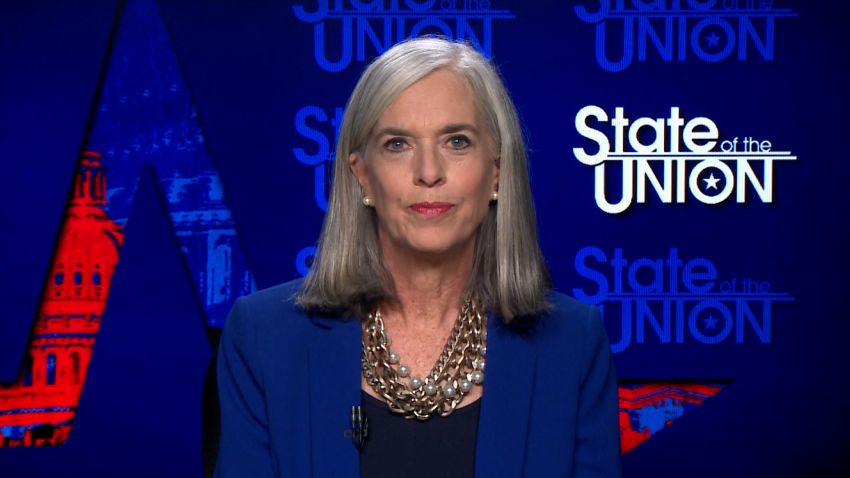
The most profound test for McCarthy could come later this year with the White House over raising the government’s capacity to borrow more money to finance spending to which Congress is already committed. If the debt ceiling isn’t raised, the US could default on its obligations, unleashing a major financial crisis.
But conservatives have said they will demand massive spending cuts to agree to free-up borrowing, in a way that will hold the economy hostage. If McCarthy, caught between his own right-wing and the need to avoid a major crisis with global reverberations, will not cave to his party’s right wing, he could find himself thrown out of a job.
As with the speaker’s race, McCarthy will apparently be boxed in by fiscal conservatives who are willing to accept government shutdowns and crises to disrupt the idea of governance itself, or by pro-Trump exhibitionists who are willing to shatter the majority for a moment in the political spotlight.
While the GOP came by its new House majority in a free and fair election, the pro-Trump cast of the conference will not only raise alarm bells for democracy – but also for McCarthy’s capacity to keep or expand the party’s control in 2024.
And greater representation for Freedom Caucus lawmakers on key committees that dictate the business of the House will ensure a far more partisan and conservative agenda – another factor that could alienate more moderate voters.
The story of the 118th Congress will almost be over McCarthy’s constant fights to control his own coalition. The spending showdowns when the GOP controlled the House for parts of the Obama administration might pale in comparison to future standoffs.
Ohio’s John Boehner – one of two Republican speakers, along with Paul Ryan, effectively driven out of their jobs by the rise of the far-right – wrote in his autobiography in 2021 that because of House extremists in his own caucus, aided by Texas Sen. Ted Cruz, there were times when “under the new rules of Crazytown, I may have been speaker, but I didn’t hold all the power.”
McCarthy already faces the same fate. But the accommodations he made just to get the job suggest he made have already have made peace with it.
